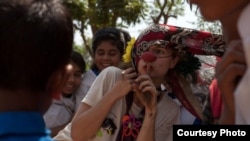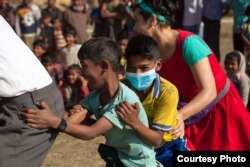The Rohingya refugee children laughed, as a group of clowns — one named Banana — tumbled, somersaulted, sang and played the tambourine.
The performance in Bangladesh's Cox's Bazar was a part of Project Kushi Kushi ("Happy Happy" in English) by Britain-based Clowns Without Borders UK, a nonprofit organization working with traumatized refugees around the world.
Clowns Without Borders UK founder Samantha Holdsworth told VOA her team hopes its performances provide psychosocial relief not only for the kids but also for their parents.
"I am just a clown, but I have seen firsthand the difference laughter can make to children struggling to make sense of the world around them," Holdsworth told VOA. "Whilst I know this won't stop disasters or the numerous wars and armed conflicts happening across the world today, I can contribute by bringing laughter to places where there is none and showing children we care about them and about what happens to them."
Kutupalong, where the performance took place, and surrounding settlements are thought to be the world's largest and most congested refugee camp, according to the World Food Program. It's estimated that nearly 1 million Rohingya refugees live in an area of only about 13 square kilometers (five square miles).
Crackdown
The Muslim minority was settled in the camp on the southeast coast of Bangladesh after fleeing Rakhine state in neighboring Myanmar because of a crackdown by Myanmar's army and Buddhist militias.
According to officials in Bangladesh, about 55 percent of the Rohingyas hosted in Kutupalong are children, and many of them are in dire need of support to recover from trauma. They say the scale of the crisis is beyond their capacity to solve and requires a global effort and response.
Bangladesh's Prime Minister Sheikh Hasina said Monday at U.N. headquarters that her country has partnered with the U.N. Children's Fund (UNICEF) to establish 1,106 learning centers for the refugee children.
She said global support was needed because the centers were able to provide informal education, psychosocial support and basic life skills training to only 136,000 Rohingya children.
"We have to understand that these children fleeing conflict, ethnic cleansing and genocide are carrying heavy psychological trauma. They can't be expected to accustom themselves to a normal school setting, as the forcibly displaced Rohingya children are now living in a different cultural setting," she said.
UNICEF said it has helped the Bangladesh government immunize 900,000 children and adults against cholera and has screened nearly 263,000 children for malnutrition.
Children under threat
Despite the care, an estimated 720,000 Rohingya children remain threatened by the approaching seasonal cyclones in Bangladesh or by ongoing violence and denial of their basic rights in Myanmar, according to UNICEF.
To the members of Clowns Without Borders UK, laughter is sorely needed for many of the Rohingya refugees, who continue to suffer from the deaths of family members and the loss of their homeland.
Project Kushi Kushi, which began this week and lasted for five days, brought together over 2,000 Rohingya children and adults.
"There is glorious defiance in the work Clowns Without Borders does, a defiance that does not accept that crisis, conflict or the threat of violence is more powerful than children having the chance to laugh and to experience, even if it's just for a moment, what it is to be a child free from concern," Holdsworth told VOA.
The clowns create the scenes, but the true actors are the children, as all performances are highly visual and nonverbal so they can be easily understood in any language.
"We create lots of moments for audience interaction that put the children in control. They become the heroes of the scene," Holdsworth said. "All refugee children have experienced opportunities to be in charge. This is incredibly important to us."





